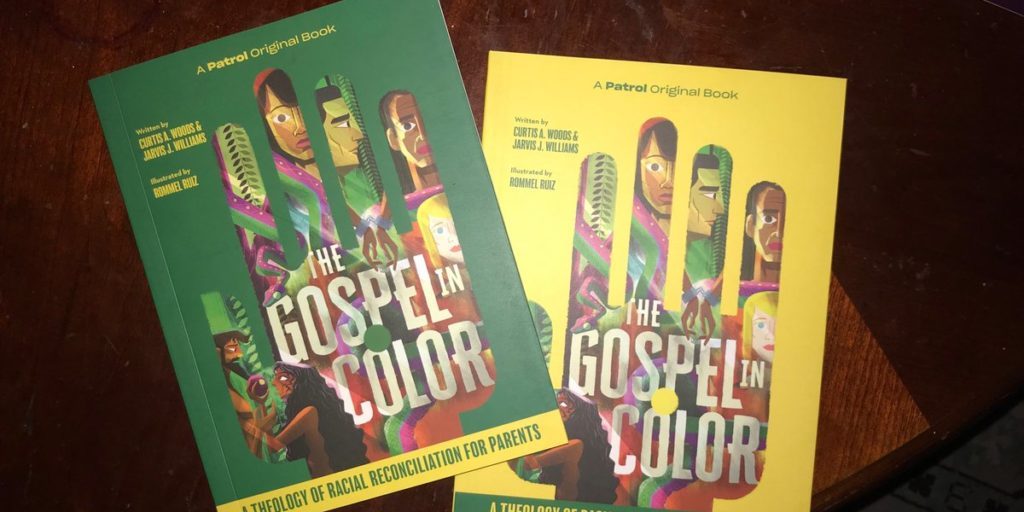
The Gospel Changes Everything
My colleague Jarvis Williams and I have been transformed by the glorious grace of God found in His unadulterated Word. The beauty of the Christian gospel has changed everything about us. We no longer harbor fear of the so-called “other” in our hearts. We intentionally engage all kinds of people because the gospel is available to all without distinction (Titus 2:11). We are conduits of grace and mercy on the behalf of the one who has set us free from the bondage of sin so that we can pursue and promote truth, goodness, and beauty. We firmly believe that God is redeeming the eyes all those who believe the glorious gospel but realize many who consider themselves “contenders for the faith that was delivered to the saints once for all” have truncated the scope of the gospel message. That is to say, they primarily envision the gospel from a vertical perspective while neglecting the horizontal and cosmological emphases which we explain in The Gospel in Color. We all need new eyes. We were blind to issues of sin in our lives until God shined His precious light on the dark corridors of our hearts. He revealed pride and racism, causing us to lean on Him rather than our own understanding. As the years progressed, God took us both on a journey to better understand how the sin of racism has shattered communal relationships in a myriad of social sectors, including the gospel-believing churches. Since Jarvis and I affirm the dictates of evangelical Christianity, we firmly believe that God began the good work of faith in our hearts, and will not complete it until the day of Jesus (Phil 1:6). Our salvation is secure because of the bloody cross of Jesus Christ who reconciled us to the Father so that we would not experience the righteous wrath of God, enabling us to rejoice in all things while fighting the sins that so easily beset us (Rom 5: 9-11; Phil 4:4; Heb 12:1)! As Christian parents, we must work diligently to model God’s love for all kinds of skin colors before our children. As Christian parents, we must work diligently to model God’s love for all kinds of skin colors before our children. Share on X The reality of racial and ethnic division in our country today means that Christian parents of all ethnic backgrounds need to teach their kids about the gospel, race, racism, ethnic difference, and discrimination. We cannot allow a secular age to set the parameters for discussing racial justice and diversity. We can no longer avoid uncomfortable conversations with our children about these issues. We must be proactive.
Color-blindness Isn’t a Solution
In response to racism, we’ve heard many well-meaning Christians and Christian parents espouse a naïve commitment to color-blindness. Essentially, color-blindness is the idea that we ought not to see color or make race-based decisions when we engage another image-bearer. The concept of color-blindness, at first blush, seems prosocial and compassionate. After all, we live in an age where many people of color have influence, power, and wealth — as evidenced by the fact that our country recently experienced a two-term black presidency. And Galatians 3:28 states that there is neither Jew nor Greek, neither slave nor free, and neither male nor female, for we are all one in Christ. As a result, some people unwittingly argue that there is no such thing as a black Christian or a white Christian —we’re all just Christians. People say that Christians should stop talking about race because talking about race will make race an issue. This color-blindness insists that ignoring racial categories and looking beyond ethnic differences will lead us to a more racially equal and just society. Right? Wrong. The problem with color-blindness is that Americans, including Christians, have inherited race-based social constructs based on a biological fiction. As a result, our society continues to uphold structures and ideas which prioritize and marginalize groups based on their perceived race, in both intentional and unintentional ways. The truth of the matter is that so-called color-blindness will not create reconciled community, because racism and ethnic discrimination are deeply rooted in the American conscience and experience. Regardless of how good color-blindness may sound to Christian parents, it’s actually cruel and damaging to the many people who experience marginalization on a regular basis precisely because of their perceived race. Colorblindness inadvertently exacerbates the very racism it seeks to avoid, because it allows the majority cultural group to maintain their privileged position, continuing a social status quo in which minority groups continue to experience discrimination and domination. Christian parents who affirm color-blindness do a great racial injustice to their kids and to the black and brown people in their churches and communities, deepening racial wounds and setting up children for emotional, spiritual, and psychological devastation when they do experience racism. So no matter how hard we try to deny these facts and to look beyond the color of one’s skin, we live in a country which makes decisions based on false beliefs about skin color and race. Ethnic discrimination is part of the ordinary and everyday rhythm of the American experience — and so we must address it with our kids frankly and wisely, by the power of the Spirit. We cannot tell our children to pretend skin colors don’t exist. Instead, we must acknowledge and celebrate the fact that God made men and women in a variety of shades — and that this is a part of his good creation. Simply put, we learn to view the gospel in color!
Racism Is a Systemic Problem
Racism and ethnic discrimination possess both individual and systemic dimensions. These forms of discrimination are deeply ingrained in the structural fabric of the United States, including within many Christian spaces and institutions, often showing up in subtle ways. That doesn’t mean that every individual person intentionally practices racist behavior against those from a different race, nor does this necessarily mean every problem experienced by black and brown people in America or in any given context results from racism. Sociologists have rightly shown that we — and our children — live in a racialized society, where one’s perceived race provides advantages or disadvantages in social interactions and achievements. And many of the challenges some image bearers of varying hues have historically experienced in the U.S. (such as slavery, Jim Crow, and the exploitation of immigrant workers) have been directly caused by racism. In the American experience, racial injustice has been especially evident between blacks and whites, but can also be seen amongst other marginalized groups as well. Native Americans, Asians, Latinos, the Irish, Jews, Arabs, and many other groups have experienced racism and discrimination simply because of their perceived differences. American history, tragically, is marred by the legacy of a social order which placed non-white men, women, and children — people created in the image of God — at the bottom and the destructive effects of this social order are arguably still felt today. We must equip our kids to understand the society they live in so that they may wisely navigate it with a gospel lens. This isn’t an option — it is a necessity.

